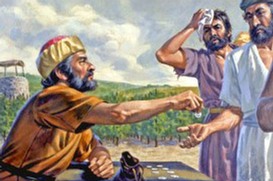



The Parish Church of St George the Martyr, Waterlooville

In modern times a business owner seeking to hire workers is obliged to consider and solve many prior issues. Among these are the legislation regarding -
This minefield of regulation had no parallel in biblical times. One of the Parables of Jesus illustrates the ancient approach. It will be recalled in Matthew I Ch 20 vv 1-
At first and superficial reading, this parable is problematic. In the first place the accusation of being unfair seems to be made out. It has been asserted by scholars that a denarius (a low value coin) was a generous wage for a day’s work. This of course depends on when the allegorical story might have taken place, since throughout the Roman Republic the value of coinage fluctuated. Furthermore, the owner’s actions ran counter to the statement in Deuteronomy, that the labourer is worthy of his hire. If the payment in this case was indeed generous then there is the problem that the later workers were wildly overpaid. It is a commercial principle that the worker provides more value to the employer than he receives in wages -
This perplexing parable has, however, a deeper meaning. For service to the Lord each servant will obtain the same reward, whatever the length of time of service. In this event there is no preferment -
Rod Dawson
Summer 2015
The Vineyard Labourers
